Children’s Medical Center Research Institute at UT Southwestern (CRI)
Children’s Medical Center Research Institute at UT Southwestern (CRI)![]() was established in 2011 as a joint venture designed to combine Children’s Health’s comprehensive clinical expertise and the internationally recognized scientific environment of UT Southwestern Medical Center.
was established in 2011 as a joint venture designed to combine Children’s Health’s comprehensive clinical expertise and the internationally recognized scientific environment of UT Southwestern Medical Center.
Located in the heart of Dallas’ Southwestern Medical District, CRI represents an unprecedented opportunity for interdisciplinary groups of high-caliber scientists and physicians to pursue research at the interface of stem cell biology, cancer and metabolism. Together, these fields hold unusual potential for discoveries that can yield groundbreaking advances in science and medicine and further drive CRI’s mission — curing someone who otherwise would not be cured.
Donate to CRICelebrating nearly 15 years of CRI
Join us on the road to relentless discovery
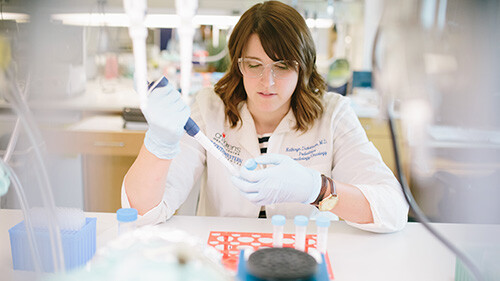
Ever since Hippocrates first investigated the causes of sickness, an understanding of basic science has been humankind’s only hope to overcome disease. However, discoveries that lead to medical breakthroughs do not come easily. Hard work, determination and sustained resources are necessary to bring scientific findings from the bench to the bedside and yield new strategies for treating disease.
To invest in research is to invest in the future. Research discoveries at CRI chart new pathways for understanding and treating disease, helping to transform medical outcomes for all patients, big and small.
Several early, generous donations helped CRI create a solid foundation for growth. Initial major funding came in 2012 when the Hamon Charitable Foundation donated $10 million in the second-largest gift ever made to Children’s Health at the time. Also in 2012, Children’s Health honored Ric and Debbie Scripps for their volunteerism, leadership and philanthropy through the establishment of the Scripps Society. The Scripps Society recognizes friends of CRI who have made contributions of $1 million or more and embody the Children’s Medical Center mission — to make life better for children.
Learn more about the work CRI is doing to make breakthrough discoveries in pediatric care.
Members of the Scripps Society
Debbie and Ric* Scripps
Patricia and Jerome T.* Abbott
Emy Lou and Jerald Baldridge
Kathryne and Gene* Bishop
W.W. Caruth, Jr. Foundation
Constantin Foundation
Dean Foods Foundation
Ute and Rolf Haberecht
Hamon Charitable Foundation
S.T. Harris Family
Hoblitzelle Foundation
The Josephine Hughes Sterling Foundation
The Jonesville Foundation
Jan Richey and Tom R. Lamphere
Charles R. Lathem
The Moody Foundation
Once Upon a Time Foundation
Kelly and David Pfeil
The Pogue Family Foundation
The Pollock Family Foundation
*deceased
The Research Team
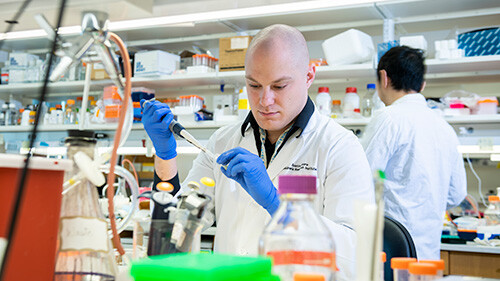
The CRI is led by Dr. Sean Morrison, an internationally recognized stem-cell expert who is a Howard Hughes Medical Institute Investigator and a member of the National Academy of Medicine, the National Academy of Sciences, and the European Molecular Biology Organization. Dr. Morrison has already recruited more than 150 researchers and scientific staff, who are now laying the groundwork for future research breakthroughs. Children’s Medical Center Foundation aspires to build on this potential and raise more than $200 million to help CRI grow to 200 scientists working in 15 labs.
Sean J. Morrison, Ph.D.
Director of CRI
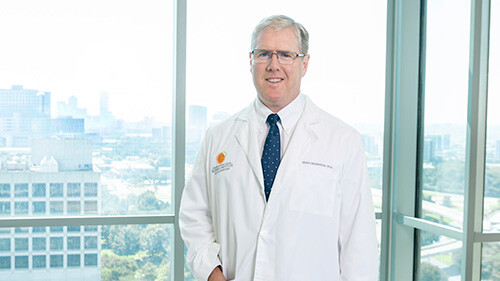
Dr. Morrison is the director of CRI and a Howard Hughes Medical Institute Investigator. He is also a member of the National Academy of Medicine, National Academy of Sciences, and the European Molecular Biology Organization. He holds the Mary McDermott Cook Chair in Pediatric Genetics and the Kathryne and Gene Bishop Distinguished Chair in Pediatric Research. Dr. Morrison completed his Ph.D. in immunology at Stanford University (1996) and a postdoctoral fellowship in neurobiology at Caltech (1999). From 1999 to 2011, Dr. Morrison was a professor at the University of Michigan, where he directed their Center for Stem Cell Biology. Dr. Morrison was among the first established investigators to be recruited to Texas as a Cancer Prevention and Research Institute of Texas (CPRIT) Scholar in Cancer Research. In December 2024, Dr. Morrison was honored with the American Society of Hematology’s E. Donnall Thomas Lecture and Prize for his paradigm-shifting research that has evolved how hematologists and other understand the regulation of hematopoietic stem cell function.
The Morrison Lab studies mechanisms that regulate stem cell function in adult tissues and the ways in which cancer cells hijack those mechanisms to enable the formation and spread of cancer.
Ralph J. DeBerardinis, M.D., Ph.D.
Professor in CRI and Director of CRI’s Genetic and Metabolic Disease Program
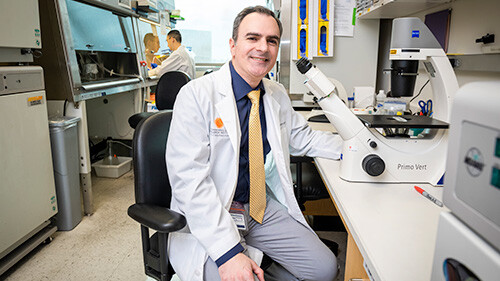
Dr. DeBerardinis is a professor in CRI and a Howard Hughes Medical Institute Investigator. Dr. DeBerardinis is also a professor of pediatrics at UT Southwestern and holds the Eugene McDermott Distinguished Chair for the Study of Human Growth and Development, the Philip O’Bryan Montgomery Jr., M.D., Distinguished Chair in Developmental Biology, and is a Sowell Family Scholar in Medical Research. At CRI, he is director of the Genetic and Metabolic Disease Program (GMDP) and the Robert L. Moody, Sr. Faculty Scholar. He is also affiliated with the Eugene McDermott Center for Human Growth and Development and the Harold C. Simmons Comprehensive Cancer Center, both at UT Southwestern.
Dr. DeBerardinis earned his M.D. and his Ph.D. from the University of Pennsylvania. He was the first trainee in the combined residency program in pediatrics and medical genetics at Children’s Hospital of Philadelphia. He performed his postdoctoral research at the University of Pennsylvania.
The DeBerardinis Lab is working to understand how altered metabolism at the cellular level contributes to several serious diseases, including inborn errors of metabolism (the result of inherited genetic defects in metabolic enzymes that lead to chemical imbalances in children) and cancer.
Hao Zhu, M.D.
Professor and the Nancy B. and Jake L. Hamon Distinguished Chair in Therapeutic Oncology Research
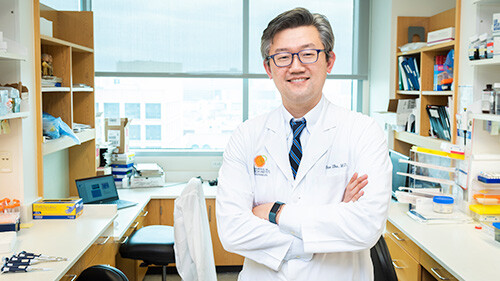
Dr. Zhu is a professor in CRI and of pediatrics and internal medicine at UT Southwestern. He earned an M.D. from Harvard Medical School and performed research training at MIT. He trained in internal medicine at the University of California, San Francisco, and in medical oncology at the Dana-Farber Cancer Institute and Harvard. From 2008 to 2012, Dr. Zhu performed postdoctoral research at Boston Children’s Hospital, exploring connections between microRNAs, metabolism and regeneration in mouse models. In 2012, he was recruited to CRI as a CPRIT Scholar in Cancer Research. Researchers in his lab seek to determine the genetic and cellular factors that influence liver regeneration and cancer and to determine if these factors are common to both processes. They also are trying to identify protective mechanisms that might suppress cancer formation in the liver.
Prashant Mishra, M.D., Ph.D.
Associate Professor
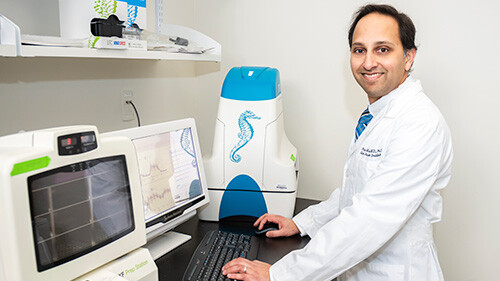
Dr. Mishra is an associate professor in CRI and of pediatrics at UT Southwestern. He is also affiliated with the Cecil H. and Ida Green Comprehensive Center for Molecular, Computational, and Systems Biology. He earned both his M.D. and his Ph.D. from UT Southwestern’s Medical Scientist Training Program. He conducted his postdoctoral research at the California Institute of Technology, where he focused on studying mechanisms that control mitochondrial behavior.
Dr. Mishra’s lab is focused on mapping how mitochondria are embedded in normal cellular function and on finding new treatments for mitochondrial diseases that affect approximately 1 in every 5,000 newborns.
Michalis Agathocleous, Ph.D.
Assistant Professor
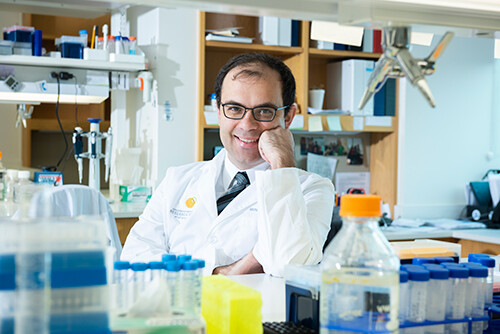
Dr. Agathocleous is an assistant professor in CRI and of pediatrics at UT Southwestern. He is also a CPRIT Scholar in Cancer Research. He earned his Ph.D. from the University of Cambridge. As a research fellow, he performed postdoctoral work at Cambridge’s Gonville & Caius College. He continued his postdoctoral work at CRI with Dr. Sean Morrison as a Royal Commission for the Exhibition of 1851 Research Fellow. His postdoctoral work led to important discoveries about the relationship between metabolism, stem cells and cancer, as well as how metabolites regulate hematopoietic stem-cell function and leukemia.
Agathocleous Lab researchers study how metabolites, the small molecules involved in cellular metabolism, impact stem cells and discover metabolic vulnerabilities of cancer cells that can become targets for therapy.
Gerta Hoxhaj, Ph.D.
Assistant Professor
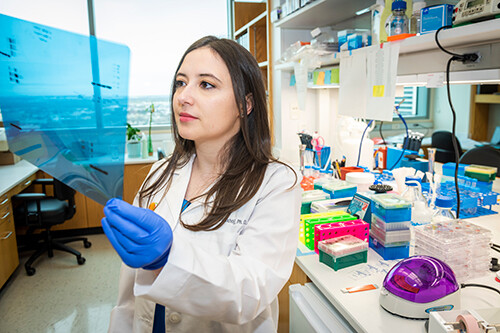
Dr. Hoxhaj received a bachelor’s from Bogazici University in Istanbul, Turkey, with a double major in molecular biology and genetics and chemistry. She received a Ph.D. in biochemistry and cell signaling from the University of Dundee in Scotland, where she characterized a new E3 ubiquitin ligase, ZNRF2, as a downstream effector of PI3K signaling. In 2013, Dr. Hoxhaj joined the Manning Lab at the Harvard School of Public Health, where she worked on understanding how oncogenic signaling influences cellular metabolism. Her postdoctoral research discovered new mechanisms that link PI3K-Akt-mTORC1 signaling with the control of nucleotide and redox metabolism.
Dr. Hoxhaj’s lab is interested in understanding the molecular mechanisms that control cellular metabolism in hopes of finding new therapeutic strategies for cancer and other metabolic disorders.
Sam McBrayer, Ph.D.
Assistant Professor

Dr. McBrayer is an assistant professor in CRI and of pediatrics at UT Southwestern. He is also a CPRIT Scholar in Cancer Research. He obtained his Ph.D. in cancer biology from Northwestern University’s Feinberg School of Medicine. He completed his postdoctoral work under Nobel Prize winner Dr. William G. Kaelin, Jr. at the Dana-Farber Cancer Institute and at Harvard Medical School as an American Cancer Society Postdoctoral Fellow. During his time in the Kaelin Lab, he studied how metabolic reprogramming occurs in glioma and developed new strategies for brain-tumor therapy.
Dr. McBrayer’s lab is working to discover metabolic mechanisms that promote brain-tumor development and developing strategies to exploit altered metabolism for cancer therapy.
Benjamin Ohlstein, M.D., Ph.D.
Associate Professor
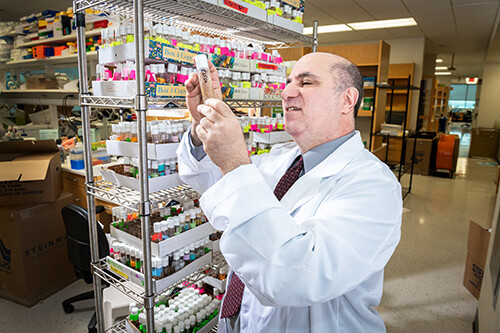
Benjamin Ohlstein received his M.D. and Ph.D. degrees from UT Southwestern Medical Center in 2002. He completed a postdoctoral fellowship at the Carnegie Institution in Baltimore, Maryland, in Allan C. Spradling’s laboratory in 2007. During his time in the Spradling Lab, he demonstrated that the adult Drosophila midgut, like the adult human intestine, is maintained by multipotent stem cells. He also found the notch signaling pathway plays a crucial role in how stem cells give rise to enterocytes and enteroendocrine cells.
After his postdoctoral studies, Dr. Ohlstein joined Columbia University Medical Center, where he was an associate professor of genetics and development and a member of the Columbia Stem Cell Initiative. He is a Howard Hughes Medical Institute Faculty Scholar. In 2020, Dr. Ohlstein joined as an associate professor in CRI and of pediatrics at UT Southwestern.
The Ohlstein Lab is working to better understand the mechanisms that guide normal and abnormal tissue functions, particularly in gastrointestinal organs such as the small and large intestines and stomach, using the Drosophila intestine as a model. Ultimately, a better understanding of the biology of the Drosophila intestinal stem cells will help with diagnosis, treatment and cures of various conditions that affect the human gastrointestinal tract.
Sihan Wu, Ph.D.
Assistant Professor
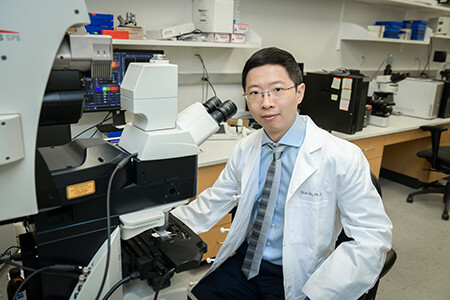
Dr. Wu has an extensive background in cancer genetics and genomics. After graduating from Sun-Yat-sen University (SYSU), where he majored in biotechnology in the Life Science School, he obtained a Ph.D. at the Zhongshan School of Medicine at SYSU. His doctoral research focused on how genetic alterations contribute to brain tumor development. His research led to the discovery that dysregulation of non-coding microRNAs contributes to the development of glioblastoma. Dr. Wu completed postdoctoral research at the Ludwig Institute for Cancer Research at the University of California, San Diego, under Dr. Paul Mischel’s mentorship. There he studied the structure and function of extrachromosomal DNA (ecDNA) in cancer, uncovering its circular shape and the functional impact of its unique physical conformation. In 2021, Dr. Wu joined as an assistant professor in CRI and of pediatrics at UT Southwestern and is a CPRIT Scholar.
Javier Garcia-Bermudez, Ph.D.
Assistant Professor
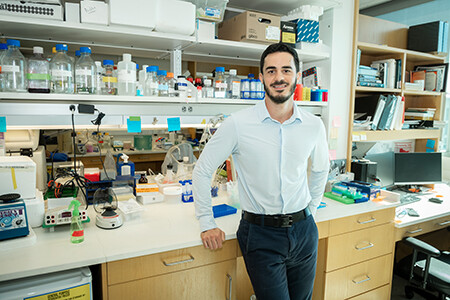
Dr. Garcia-Bermudez received his bachelor’s in biochemistry and Ph.D. in biochemistry and molecular biology from the Autonomous University of Madrid in Spain. He studied the role of mitochondrial respiration in cancer progression and stem cell differentiation. In 2016, Dr. Garcia-Bermudez joined Dr. Kivanc Birsoy’s laboratory at The Rockefeller University as an European Molecular Biology Organization Long-Term Fellow and a Leukemia and Lymphoma Society Special Fellow. His postdoctoral research uncovered critical metabolic dependencies of cancers exposed to low oxygen and lipid peroxidation stress.
In December 2021, Dr. Garcia-Bermudez joined as an assistant professor in CRI and of pediatrics at UT Southwestern.
Dr. Garcia-Bermudez received a 2024 NIH Director’s New Innovator Award![]() and has been named an American Cancer Society Research Scholar. He is a CPRIT Scholar, has received a transition award from the National Cancer Institute (NCI-NIH) to support his studies on metabolic liabilities of tumors.
and has been named an American Cancer Society Research Scholar. He is a CPRIT Scholar, has received a transition award from the National Cancer Institute (NCI-NIH) to support his studies on metabolic liabilities of tumors.
Most recently, Dr. Garcia-Bermudez was named a 2025 Pew-Stewart Scholar in Cancer Research. Learn more about Dr. Garcia-Bermudez’s lab here![]() .
.
Shang Ma, Ph.D.
Assistant Professor
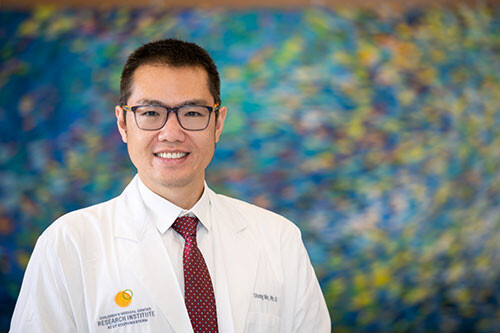
Dr. Ma received a bachelor’s in genetics from the University of British Columbia in Vancouver, Canada. He earned a Ph.D. in cellular and molecular biology from University of Wisconsin in Madison, where he focused on chemical signaling pathways that mediate mammalian brain development. In 2015, Dr. Ma joined Dr. Ardem Patapoutian’s group at Scripps Research to study how cells sense mechanical forces during pathogenesis. During his postdoctoral training, he discovered that overactive PIEZO mechanosensitive ion channels play important roles in various human disorders.
In 2022, Dr. Ma joined as an assistant professor in CRI and of pediatrics at UT Southwestern.
Hijai Regina Shin, Ph.D.
Assistant Professor
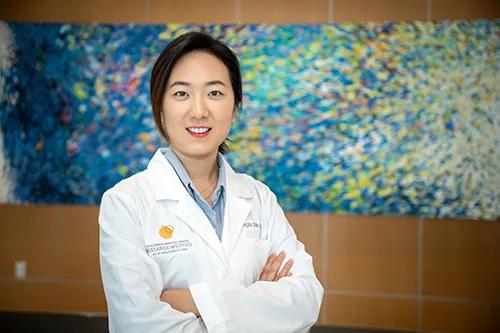
Dr. Shin grew up in France before moving to South Korea to obtain her bachelor’s and Ph.D. at Seoul National University. During her Ph.D., she worked on the epigenetic and transcriptional regulation of autophagy. Dr. Shin later joined Dr. Roberto Zoncu's lab at the University of California, Berkeley, where she used biochemistry, cell biology, and chemical biology approaches to understand the lysosome as the center of nutrient sensing and cellular quality control.
During her postdoctoral training, she discovered LYCHOS, a cholesterol sensor in lysosomes that regulates metabolism. She received fellowships from the American Association for Cancer Research and the Association for Frontotemporal Degeneration.
In 2024, Dr. Shin joined Children’s Medical Center Research Institute at UT Southwestern as an Assistant Professor, as well as Pediatrics.
She was named a 2025 Searle Scholar and 2025 Pew Scholar in Biomedical Sciences to continue her groundbreaking lysosome research. Learn more about Dr. Shin's lab here![]() .
.
Peter Ly, Ph.D.
Assistant Professor
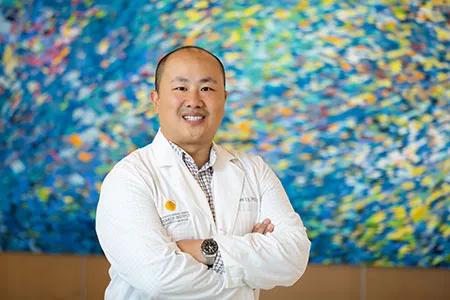
Dr. Ly received his bachelor’s in biology from Baylor University and his doctorate in cancer biology from UT Southwestern Medical Center. His graduate work with Dr. Jerry Shay and Dr. Woodring Wright examined how aneuploidy, an abnormal number of chromosomes, contributes to malignant transformation.
His postdoctoral research, at the Ludwig Institute for Cancer Research at the University of California San Diego with Dr. Don Cleveland, focused on understanding how mitotic chromosome segregation errors drive complex genomic rearrangements through a process called chromothripsis.
In 2019, Dr. Ly returned to UT Southwestern to establish his independent group in the Department of Pathology, and, in 2025, Dr. Ly joined CRI. He holds secondary appointments in Cell Biology, Pediatrics, and the Harold C. Simmons Comprehensive Cancer Center at UT Southwestern. Learn more about Dr. Ly's lab here![]() .
.

